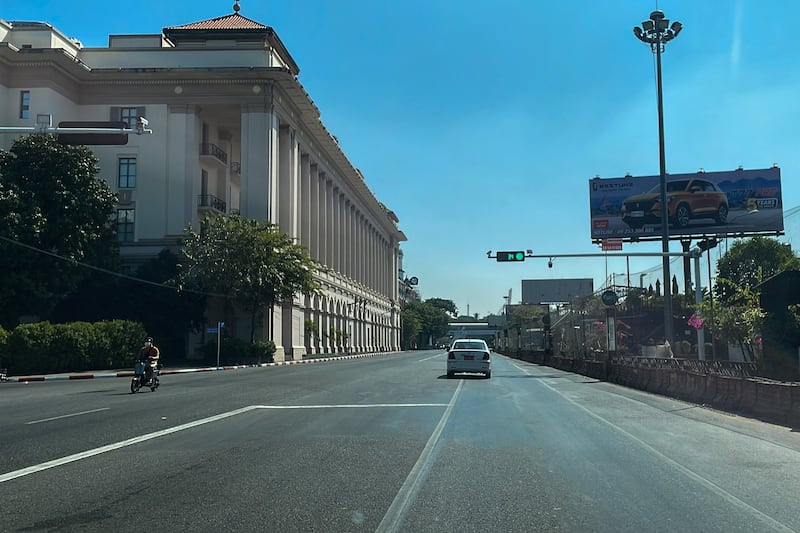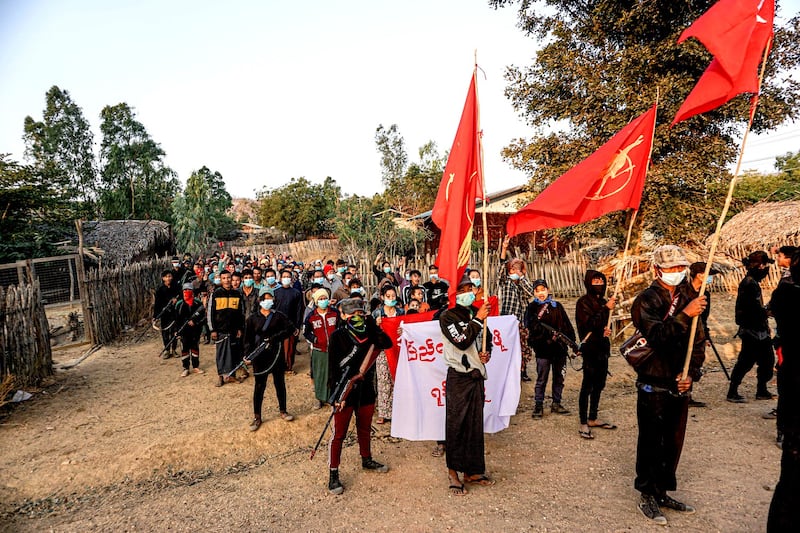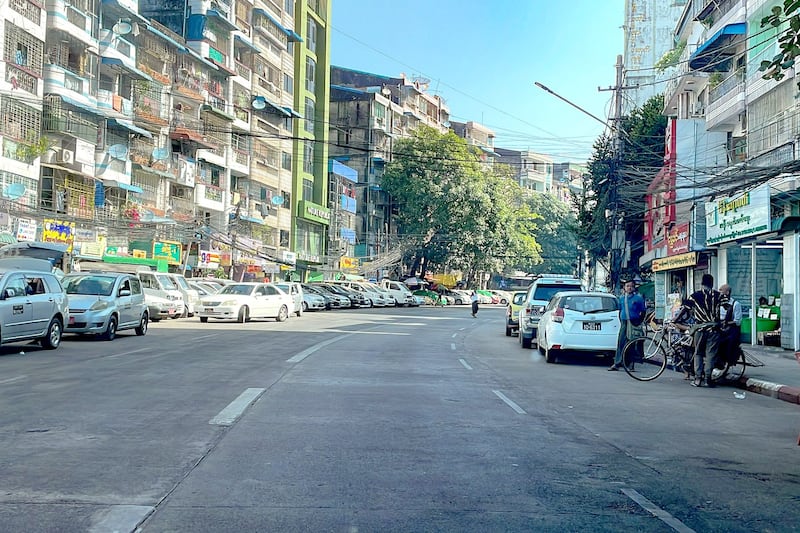UPDATED at 6:35 P.M. on 2022-02-01
Streets in Myanmar were largely empty today as people across the country took part in a mass “Silent Strike” to protest the one-year anniversary of the military coup on Tuesday, despite a week of junta threats and arrests of organizers.
Public areas around the country were noticeably barren beginning around 9 a.m., except for occasional groups of young people holding flash protests. In the lead up to the anniversary of the Feb. 1, 2021, coup, authorities had warned of tough punishments — including life in prison — for anyone found applauding, honking or otherwise expressing support for the strike.
Tuesday marked the third Silent Strike since the military seized power, the others coming in March in the immediate aftermath of the putsch and in December on International Human Rights Day. In the past year, security forces have arrested nearly 8,900 civilians and killed more than 1,500 — mostly during nonviolent anti-junta protests, according to the Bangkok-based Assistance Association for Political Prisoners.
A housewife in Yangon region’s Kyi Myin Daing township told RFA’s Myanmar Service that shops stayed open on Tuesday, but shoppers and pedestrians were nowhere to be seen in the city of more than 5 million people.
“During the first Silent Strike, the streets were empty, and all the shops were closed. But this time, the authorities pressured the shop owners to remain open — they were asked to sign pledges that they would do so,” she said, speaking on condition of anonymity, citing fear of reprisal.
“I was at the market this morning and only saw two or three people there. After 9 a.m., the streets were empty. I saw the shops and vendors opened as usual. But I didn’t go out after that.”
Similarly, shops were open in Myanmar’s second-largest city Mandalay, while the main roads remained largely devoid of people, sources said.
Thura Aung, a Mandalay-based organizer, said his group Mandalay Forces for Strikes began staging a protest early on Tuesday morning.
“It has been a year. The military council has not gained the control of the country. The power is still in the hands of the people. Law and order are still in the hands of the people,” he said.
“We want to show that we can protest and be silent if we want to in our city. We came out to show that we have not given up on the revolution even after one year.”
While protests in Mandalay were largely silent, a 40-year-old man named Aung Aung staged a self-immolation in opposition to military rule in the region’s Kyauk Pan Daung township around noon and later died from his injuries, sources said. Aung Aung, who specifically expressed opposition to government management of electricity amid frequent outages around the nation, was survived by his wife and two children.

Junta counter-protests
In the capital Naypyidaw, sources told RFA that most residents stayed home, although some small parades took place showing support for the junta.
“Most people didn’t go out, but the shops were open. Some of the owners were pressured by the authorities. They ordered them to open their shops,” said one resident, who declined to be named.
“Most people going out today are supporters of the [junta]. I saw a group of people holding flags and signs showing support for the military marching this morning.”
Government employees in Naypyidaw said junta ministries issued a directive shortening work hours on Tuesday to between 10 a.m. and 3 p.m., suggesting that they may have been pressured to take part in displays of loyalty to the military.
Similar counter-protests in support of the junta were reported in other townships around the country.
Leo, an organizer with the General Strike Committee in Yangon, told RFA that support for resistance to the junta remains strong, despite the difficulties of the past year under military rule.
“On this day that marks the one-year anniversary, we are organizing many forms of protests to keep up the momentum of support for a popular revolt,” he said. “The strikes will continue.”
RFA received reports that at least 70 shop owners in Yangon, Mandalay, Naypyidaw and other cities were arrested in the week leading up to Tuesday after they announced that their businesses would be closed on Feb. 1 to show support for the Silent Strike.

Global condemnation
The anniversary of the coup was met with condemnation on Tuesday in a joint statement from the High Representative on behalf of the European Union and foreign ministers from several democratic nations, who noted that after a year under military rule, more than 14 million people in Myanmar are in humanitarian need, the economy is in crisis, political reforms had been reversed, and conflict is spreading across the country.
"The military regime bears responsibility for this crisis, which has gravely undermined peace and stability in Myanmar and the region," said the statement, which was signed by representatives of Albania, Australia, Canada, New Zealand, Norway, South Korea, Switzerland, the U.K. and the U.S.
"We once again call for the immediate cessation of violence and for constructive dialogue among all parties to resolve the crisis peacefully. We reiterate our call on the military regime to immediately end the State of Emergency, allow unhindered humanitarian access, release all arbitrarily detained persons, including foreigners, and swiftly return the country to the democratic process."
The ministers highlighted their support for the "Five-Point Consensus" to end the political crisis in Myanmar that was agreed to by junta chief Snr. Gen. Min Aung Hlaing and Myanmar's fellow members of the Association of Southeast Asian Nations (ASEAN) during an emergency meeting in April last year, but which the junta has failed to implement, and reiterated calls for a special envoy from the bloc to help mediate the situation.
Fellow ASEAN members Indonesia and Singapore also issued strongly-worded statements on Tuesday, with the former saying it "deplores" the military's actions and the latter expressing concern that "conditions in Myanmar for the people continue to deteriorate" a year after the coup. Both called for a swift implementation of the Five-Point Consensus.
U.N. Human Rights chief Michelle Bachelet likened the conflict in Myanmar to a civil war in an interview with the BBC and called on the U.N. Security Council to take "stronger action" to put pressure on the military to restore democracy. She said that the international response "lacked urgency" and warned that the conflict now threatened regional stability.
The United States Commission on International Religious Freedom (USCIRF) said in a statement on Tuesday that the coup had “exacerbated already dire religious freedom conditions for [Myanmar’s] vulnerable religious communities" and called on the U.S. government to "support the continued pursuit for accountability for the many human rights abuses perpetrated by the [junta]," especially those committed against the country's minority Muslim and Christian communities.

Extension of rule
Observers told RFA they expect repression under military rule to only worsen following a decision by the National Defense and Security Council on Monday to extend the state of emergency in Myanmar, citing “local and foreign destructive forces” working toward “total annihilation” of the country, “terrorist attacks,” unfinished political appointments, and a need for “a genuine and disciplined multi-party democracy.”
“I think the military will fight at full throttle in next six months," said political analyst Than Soe Naing.
"I assume they will use all of their tactics -- such as killing civilians, burning villages, putting people in prison -- on a higher scale. They will speed up their military operations to crush the resistance. I think there will be battles that decide the future of the military soon.”
Others suggested that the military would renege on promises to hold new elections or abolish the constitution to maintain power, and that Min Aung Hlaing may try to establish a dynastic rule in the country, installing his son when he decides to step down.
But Nang Linn, a former member of a student activist group, said the junta's "best bet" for survival is to restore a civilian government, because "the resistance will grow as long as they extend their rule."
“If they genuinely care about the country and restoring peace and prosperity, the [junta] should end its rule and return power to the civilian government elected by the people," he said.
"We cannot tolerate an autocracy enforced with guns anymore. They should return to the military barracks under a civilian government. Only then, will the country be able to flourish again.”
Reported by RFA’s Myanmar Service. Translated by Ye Kaung Myint Maung. Written in English by Joshua Lipes.
